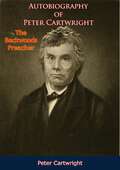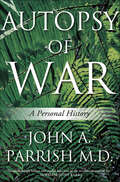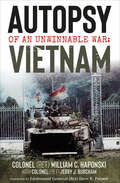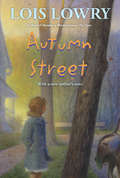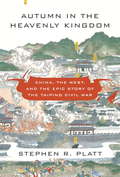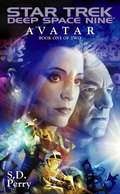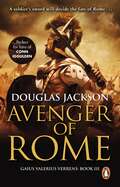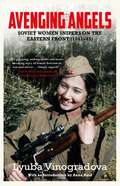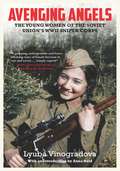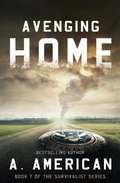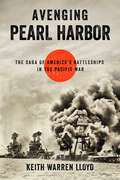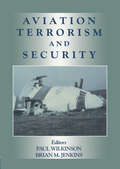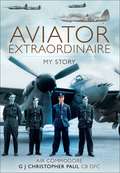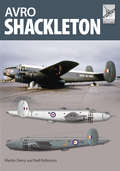- Table View
- List View
Autobiography Of Philip H. Dewey; Farmer, Lumberman, State Official
by Philip H DeweyStep into the life of Philip H. Dewey with his compelling memoir, Autobiography of Philip H. Dewey: Farmer, Lumberman, State Official. This engaging autobiography offers a firsthand account of Dewey’s multifaceted life, providing readers with a rich tapestry of personal anecdotes, professional achievements, and historical insights.Philip H. Dewey’s life journey is a quintessential American story, reflecting the values of hard work, determination, and public service. From his early days as a farmer navigating the challenges of rural life to his ventures into the lumber industry, Dewey's narrative captures the spirit of entrepreneurship and resilience. His experiences in the lumber trade highlight the industry's significance in shaping local economies and the broader American landscape during his era.Throughout the autobiography, Dewey’s vivid storytelling brings to life the people, places, and events that shaped his journey. His narrative is enriched with historical context, offering readers a window into the socio-economic conditions and cultural milieu of his times. Dewey’s memoir is not only a personal chronicle but also a historical document that captures the evolution of American society through the lens of an individual’s experiences.Autobiography of Philip H. Dewey is an essential read for history enthusiasts, students of American studies, and anyone interested in the personal stories behind the nation’s development. Dewey’s candid and heartfelt account inspires and informs, celebrating the enduring values of hard work, dedication, and service.Join Philip H. Dewey on a journey through a life well-lived, and discover the remarkable story of a farmer, lumberman, and state official who made a lasting impact on his community and beyond. This autobiography is a testament to the power of perseverance and the enduring importance of contributing to the greater good.
Autobiography of Peter Cartwright,: The Backwoods Preacher
by Peter CartwrightWithout a formal education, equipped only with a Bible, hymnbook & a copy of the "Methodist Discipline" the outspoken, hellfire-brimstone preacher covered circuits on horseback through Kentucky, Tennessee, Ohio, Indiana, & Illinois for over 50 years, preaching more than 15 thousand sermons & personally baptizing over 12,000 converts. He became a member of the Illinois Legislature but lost to Abraham Lincoln in a race for Congress. He founded Illinois Wesleyan University. He knew God & understood men & issues. Many of his statements on the church, evangelism, slavery, cults, & theology were profound & some were prophetic. He had a burning heart for souls that drove him on often against incredible forces. He took on infidels, cultists, slave-owners, modernists, ruffians, Indians, heretics, tavern owners, & Jesuits with equal fervor & boldness.-Print ed.
Autonomous Military Robotics (SpringerBriefs in Computer Science)
by Vishnu Nath Stephen E. LevinsonThis SpringerBrief reveals the latest techniques in computer vision and machine learning on robots that are designed as accurate and efficient military snipers. Militaries around the world are investigating this technology to simplify the time, cost and safety measures necessary for training human snipers. These robots are developed by combining crucial aspects of computer science research areas including image processing, robotic kinematics and learning algorithms. The authors explain how a new humanoid robot, the iCub, uses high-speed cameras and computer vision algorithms to track the object that has been classified as a target. The robot adjusts its arm and the gun muzzle for maximum accuracy, due to a neural model that includes the parameters of its joint angles, the velocity of the bullet and the approximate distance of the target. A thorough literature review provides helpful context for the experiments. Of practical interest to military forces around the world, this brief is designed for professionals and researchers working in military robotics. It will also be useful for advanced level computer science students focused on computer vision, AI and machine learning issues.
Autonomous Vehicles In Support Of Naval Operations
by National Research Council of the National AcademiesThe National Academies Press (NAP)--publisher for the National Academies--publishes more than 200 books a year offering the most authoritative views, definitive information, and groundbreaking recommendations on a wide range of topics in science, engineering, and health. Our books are unique in that they are authored by the nation's leading experts in every scientific field.
Autonomous Weapons Systems
by Liu Claus Kreß Susanne Beck Robin Geiß Nehal Bhuta Hin-YanThe intense and polemical debate over the legality and morality of weapons systems to which human cognitive functions are delegated (up to and including the capacity to select targets and release weapons without further human intervention) addresses a phenomena which does not yet exist but which is widely claimed to be emergent. This groundbreaking collection combines contributions from roboticists, legal scholars, philosophers and sociologists of science in order to recast the debate in a manner that clarifies key areas and articulates questions for future research. The contributors develop insights with direct policy relevance, including who bears responsibility for autonomous weapons systems, whether they would violate fundamental ethical and legal norms, and how to regulate their development. It is essential reading for those concerned about this emerging phenomenon and its consequences for the future of humanity.
Autopsy of War: A Personal History
by John A. ParrishOn the outside, John Parrish is a highly successful doctor, having risen to the top of his field as department head at Harvard Medical School and Massachusetts General Hospital. Inside, however, he was so tortured by the memories of his tour of duty as a marine battlefield doctor in Vietnam that he was unable to live a normal life. In Autopsy of War, the author delivers an unflinching narrative chronicling his four-decade battle with the unseen enemy in his own mind as he struggled with Post-Traumatic Stress Disorder.Parrish examines his Southern Baptist childhood and the profound influence of his father, a fire and brimstone preacher turned Navy chaplain, while offering a candid assessment of the "God and Country" ethos that leads young men to rush wide-eyed into war. He describes the unimaginable carnage and acts of cruelty he witnessed in Vietnam, experiences that shattered his world view leaving him to retreat from his family upon his return stateside. Living virtually homeless at times, he visited veteran shelters and relived the horrors of war in a series of harrowing flashbacks as he dealt with suicidal thoughts. The author writes honestly and probingly of his episodes of infidelity and battles with sex addiction. Readers follow his steady journey toward recovery and his professional contributions in the field of medicine and technology, as well as a joint program with the Boston Red Sox and Massachusetts General Hospital to aid returning veterans. Perhaps most poignantly, Parrish speaks of his quest to discover the identity of one particular solider in Vietnam he could not save—and whose memory has haunted him ever since.Autopsy of War is a soul searching memoir that is both an intensely personal narrative and a universally relevant trip through the world of war and recovery.
Autopsy of an Unwinnable War: Vietnam
by Colonel William C. Haponski Colonel Jerry J. BurchamA military studies professor and former combatant &“rationally dissects the strategies and mindsets on both sides&” of this thirty-year conflict (New York Journal of Books). Since the fall of Saigon in 1975, there have been much discussion of why (and whether) America lost the war in Vietnam. The common belief is that the war was lost not on the battlefield but in Washington, DC. The stark facts, though, are that the Vietnam War was lost before the first American shot was fired. In fact, it was lost before the first French Expeditionary Corps shot, almost two decades earlier, and was finally lost when the South Vietnamese fought partly, then entirely, on their own. Offering an informed narrative of the entire thirty-year war, this book seeks to explain why. Written by a combatant in six large battles and many smaller firefights who was also a leader with a full range of pacification duties, a commander who lost forty-three wonderful young men, Autopsy of an Unwinnable War is the result of a quest for answers by one who, after decades of wondering what it was all about, turned to a years-long search of French, American, and Vietnamese sources. This is a story lived and revealed mainly by the people inside Vietnam who were directly involved in the war, from leaders in high positions down to the jungle boots and sandals level of the fighters—and among the Vietnamese who were living it. Because of what was happening inside Vietnam itself, no matter what policies and directives came out of Paris or Washington, or the influences in Moscow or Beijing, it is about a Vietnamese idea that would eventually triumph over bullets. Includes photographs
Autumn Street
by Lois LowryWhen her father leaves to fight in World War II, Elizabeth goes with her mother and sister to her grandfather's house, where she learns to face up to the always puzzling and often cruel realities of the adult world.
Autumn in the Heavenly Kingdom: China, the West, and the Epic Story of the Taiping Civil War
by Stephen R. PlattA gripping account of China's nineteenth-century Taiping Rebellion, one of the largest civil wars in history. Autumn in the Heavenly Kingdom brims with unforgettable characters and vivid re-creations of massive and often gruesome battles--a sweeping yet intimate portrait of the conflict that shaped the fate of modern China. The story begins in the early 1850s, the waning years of the Qing dynasty, when word spread of a major revolution brewing in the provinces, led by a failed civil servant who claimed to be the son of God and brother of Jesus. The Taiping rebels drew their power from the poor and the disenfranchised, unleashing the ethnic rage of millions of Chinese against their Manchu rulers. This homegrown movement seemed all but unstoppable until Britain and the United States stepped in and threw their support behind the Manchus: after years of massive carnage, all opposition to Qing rule was effectively snuffed out for generations. Stephen R. Platt recounts these events in spellbinding detail, building his story on two fascinating characters with opposing visions for China's future: the conservative Confucian scholar Zeng Guofan, an accidental general who emerged as the most influential military strategist in China's modern history; and Hong Rengan, a brilliant Taiping leader whose grand vision of building a modern, industrial, and pro-Western Chinese state ended in tragic failure. This is an essential and enthralling history of the rise and fall of the movement that, a century and a half ago, might have launched China on an entirely different path into the modern world.
Available Light (Star Trek: The Next Generation)
by Dayton WardThe past comes back to haunt Captain Jean-Luc Picard in this brand new thriller set in the universe of Star Trek: The Next Generation.Section 31, the covert organization which has operated without accountability in the shadows for more than two centuries, has been exposed. Throughout the Federation, the rogue group’s agents and leaders are being taken into custody as the sheer scope of its misdeeds comes to light. Now Starfleet Command must decide the consequences for numerous officers caught up in the scandal—including Admirals William Ross, Edward Jellico, Alynna Nechayev, and Captain Jean-Luc Picard who, along with many others, are implicated in the forced removal of a Federation president. Meanwhile, deep in the distant, unexplored region of space known as the Odyssean Pass, Picard and the crew of the Starship Enterprise must put aside personal feelings and political concerns as they investigate a massive mysterious spacecraft. Adrift for centuries in the void, the ship is vital to the survival of an endangered civilization which has spent generations searching for a world to sustain what remains of its people. Complicating matters is a band of marauders who have their own designs on the ancient ship, with only the Enterprise standing in their way....
Avatar Book One: Star Trek Deep Space Nine (Star Trek: Deep Space Nine)
by S. D. PerryRETURN TO THE EDGE OF THE FINAL FRONTIER. In the aftermath of a war that brought the Alpha Quadrant to the brink of destruction, Starbase Deep Space 9 -- the galaxy's nexus of scientific and military intrigue -- is once more the flashpoint of impending Armageddon as a surprise attack cripples the station, killing hundreds and threatening the fragile new peace. Colonel Kira Nerys and the survivors -- together with several controversial new officers -- are all who stand against the outbreak of a new war and a terrible doom tied to the unborn child of Captain Benjamin Sisko. Elsewhere, Captain Jean-Luc Picard and the crew of the Starship Enterprise make a startling discovery...one that will affect the destiny of an entire civilization and forever change the lives of those aboard Deep Space 9. A BOLD NEW BEGINNING FOR ONE OF THE MOST COMPELLING STAR TREK® SAGAS OF ALL.
Avenger Wrath: Warthog en Afghanistan
by Steve StoneAvenger Wrath est l'histoire d'un Hog Driver et de sa chevauchée pendant la guerre en Afghanistan, opérant depuis la base aérienne de Bagram avec la magnifique chaîne de montagnes afghane, bien que mortelle, en toile de fond. L'A-10 a été utilisé presque constamment en Afghanistan, se révélant une fois de plus comme une plate-forme d'armes formidable et capable. Cette version révisée et mise à jour du livre est devenue plus poignante car le F-35 a la chance de prouver qu'il peut assumer le rôle des A-10. L'A-10 devrait rester en service au moins jusqu'en 2022, avec une prolongation de la durée de vie, peut-être jusqu'en 2040. Équipé du GAU-8 Avenger, un canon de 30 mm, conçu pour couper le blindage des chars, s'est avéré tout aussi efficace pour déchirer les épais murs de boue des complexes dans lesquels les talibans se réfugiaient souvent pour monter des embuscades sur les troupes de la coalition. Il a une capacité de survie comme aucun autre avion actuellement en opération et a ramené son pilote dans un état qui aurait causé l'écrasement d'autres avions. Suivez cette histoire à indice d'octane élevé basée sur des opérations réelles et obtenez un aperçu passionnant d'un avion incroyable.
Avenger of Rome: (Gaius Valerius Verrens 3): a gripping and vivid Roman page-turner you won’t want to stop reading (Gaius Valerius Verrens #3)
by Douglas JacksonIf you like Simon Scarrow and Ben Kane, you'll absolutely love this enthralling and action-packed novel of Roman adventure from bestselling author Douglas Jackson. Readers are loving Gaius Valerius Verrens! "A triumph of a novel" - 5 STARS"Impossible to put down." - 5 STARS"A real unputdownable read" - 5 STARS"Spellbinding" - 5 STARS***************************************************************************************A SOLDIER'S SWORD WILL DECIDE THE FATE OF ROMEEmperor Nero's grip on power is weakening - more and more fearful of losing his position, his paranoia settles on the figure of the popular Gnaeus Domitius Corbulo, Rome's greatest General who leads the imperial legions in the East. Is he preparing to march against Rome?Gaius Valerius Verrens is ordered to Antioch on a mission to kill Corbulo, a soldier he worships...Yet Corbulo's eyes are not on Rome, but on a new threat to the Empire's border: the Parthian King, Vologases, is marching to war and with such an army that if not stopped he might overwhelm the entire Roman east.Valerius marches at Corbulo's side. Outnumbered they make a stand to meet Vologases in an epic contest of military might and ingenuity that will decide the fate of the Empire. And while he fights for the Empire, and for his own survival on the battlefield, Valerius must decide whether to complete his mission, or risk incurring his Emperor's dangerous wrath.Gaius Valerius Verrens's adventures continue in Sword of Rome.
Avenging Angel-John Brown#s Raid on Harpers Ferry 1859
by Ron Field Johnny ShumateThe Harpers Ferry raid confirmed for many Southerners the existence of a widespread Northern plot against slavery. In fact, Brown had raised funds for his raid from Northern abolitionists. To arm the slaves, he ordered one thousand pikes from a Connecticut manufacturer. Letters to Governor Wise betrayed the mixed feelings people held for Brown. For some, he was simply insane and should not be hanged. For others, he was a martyr to the cause of abolition, and his quick trial and execution reflected the fear and arrogance of the Virginia slave-owning aristocracy. Many Northerners condemned Brown's actions but thought him right in his conviction that slavery had to end. John Brown's raid on Harpers Ferry and his subsequent execution further polarized North and South and made a solution of the slavery issue central to the national debate which ultimately led to Civil War in 1861.
Avenging Angels: Soviet women snipers on the Eastern front (1941–45)
by Lyuba Vinogradova"Lyuba Vinogradova is a historian with a writer's dramatic eye. By personally interviewing many of the Russian women who as teenagers during WW2 took up arms to defend the motherland, her story becomes undeniably poignant and powerful" MARTIN CRUZ SMITH, author of Gorky ParkThe girls came from every corner of the U.S.S.R. They were factory workers, domestic servants, teachers and clerks, and few were older than twenty. Though many had led hard lives before the war, nothing could have prepared them for the brutal facts of their new existence: with their country on its knees, and millions of its men already dead, grievously wounded or in captivity, from 1942 onwards thousands of Soviet women were trained as snipers.Thrown into the midst of some of the fiercest fighting of the Second World War they would soon learn what it was like to spend hour upon hour hunting German soldiers in the bleak expanses of no-man's-land; they would become familiar with the awful power that comes with taking another person's life; and in turn they would discover how it feels to see your closest friends torn away from you by an enemy shell or bullet.In a narrative that travels from the sinister catacombs beneath the Kerch Peninsula to Byelorussia's primeval forests and, finally, to the smoking ruins of the Third Reich, Lyuba Vinogradova recounts the untold stories of these brave young women. Drawing on diaries, letters and interviews with survivors, as well as previously unpublished material from the military archives, she offers a moving and unforgettable record of their experiences: the rigorous training, the squalid living quarters, the blood and chaos of the Eastern Front, and those moments of laughter and happiness that occasionally allowed the girls to forget, for a second or two, their horrifying circumstances. Avenging Angels is a masterful account of an all-too-often overlooked chapter of history, and an unparalleled account of these women's lives.Translated from the Russian by Arch Tait
Avenging Angels: Soviet women snipers on the Eastern front (1941–45)
by Lyuba Vinogradova"Lyuba Vinogradova is a historian with a writer's dramatic eye. By personally interviewing many of the Russian women who as teenagers during WW2 took up arms to defend the motherland, her story becomes undeniably poignant and powerful" MARTIN CRUZ SMITH, author of Gorky ParkThe girls came from every corner of the U.S.S.R. They were factory workers, domestic servants, teachers and clerks, and few were older than twenty. Though many had led hard lives before the war, nothing could have prepared them for the brutal facts of their new existence: with their country on its knees, and millions of its men already dead, grievously wounded or in captivity, from 1942 onwards thousands of Soviet women were trained as snipers.Thrown into the midst of some of the fiercest fighting of the Second World War they would soon learn what it was like to spend hour upon hour hunting German soldiers in the bleak expanses of no-man's-land; they would become familiar with the awful power that comes with taking another person's life; and in turn they would discover how it feels to see your closest friends torn away from you by an enemy shell or bullet.In a narrative that travels from the sinister catacombs beneath the Kerch Peninsula to Byelorussia's primeval forests and, finally, to the smoking ruins of the Third Reich, Lyuba Vinogradova recounts the untold stories of these brave young women. Drawing on diaries, letters and interviews with survivors, as well as previously unpublished material from the military archives, she offers a moving and unforgettable record of their experiences: the rigorous training, the squalid living quarters, the blood and chaos of the Eastern Front, and those moments of laughter and happiness that occasionally allowed the girls to forget, for a second or two, their horrifying circumstances. Avenging Angels is a masterful account of an all-too-often overlooked chapter of history, and an unparalleled account of these women's lives.Translated from the Russian by Arch Tait
Avenging Angels: Young Women Of The Soviet Union's Wwii Sniper Corps
by Lyuba VinogradovaBeginning in 1942, with the Eastern Front having claimed the lives of several million Soviet soldiers, Stalin's Red Army began drafting tens of thousands of women, most of them in their teens or early twenties, to defend against the Nazi invasion. Some volunteered, but most were given no choice, in particular about whether to become a sniper or to fill some other combat role.After a few months of brutal training, the female snipers were issued with high-powered rifles and sent to the front. Almost without exception, their first kill came as a great shock, and changed them forever. But as the number of kills grew, many snipers became addicted to their new profession, some to the point of becoming depressed if a "hunt" proved fruitless.Accounts from the veterans of the female sniper corps include vivid descriptions of the close bonds they formed with their fellow soldiers, but also the many hardships and deprivations they faced: days and days in a trench without enough food, water, or rest, their lives constantly at risk from the enemy and from the cold; burying their friends, most of them yet to leave their teenage years; or the frequent sexual harassment by male officers.Although many of these young women were killed, often on their first day of combat, the majority returned from the front, only to face the usual constellation of trials with which every war veteran is familiar. Some continued their studies, but most were forced to work, even as they also started families or struggled to adjust to life as single parents. Nearly all of them were still in their early twenties, and despite the physical and mental scars left by the war, they had no time for complaints as the Soviet Union rebuilt following the war.Drawing on original interviews, diaries, and previously unpublished archival material, historian Lyuba Vinogradova has produced an unparalleled quilt of first-person narratives about these women's lives. This fascinating document brings the realities and hardships faced by the Red Army's female sniper corps to life, shedding light on a little-known aspect of the Soviet Union's struggles against Hitler's war machine.
Avenging Home (The Survivalist Series #7)
by A. AmericanBooks 7 of the Survivalist Series follows Morgan and group as they fight to remove the DHS threat from the area. But there are bigger forces coming into play that will change everything.
Avenging Pearl Harbor: The Saga of America's Battleships in the Pacific War
by Keith Warren LloydIt was a miracle three years in the making, a testimony to American fortitude and ingenuity—and perhaps the key to why the United States won a war that after Pearl Harbor seemed hopeless. Impeccably researched, Avenging Pearl Harbor is colorfully written, personal, chilling, visceral. Historian Keith Warren Lloyd brings his gift for injecting life and personalities and heretofore untold stories of the men and women involved-–members of what became known as The Greatest Generation—whose heroism and sacrifice brought about the miraculous new life of a sleeping military force that was reeling and on its knees.It is a story has never before been told in such detail and with such vibrancy.On the night of 24 October 1944, a force of two battleships, one heavy cruiser and four destroyers from the Imperial Japanese Navy steamed into Surigao Strait in the Philippines. Their objective: to attack the invasion fleet of General Douglas MacArthur&’s army in Leyte Gulf. Alerted by scouting PT boats, the U.S. 7th Fleet under the command of Rear Admiral Jesse Oldendorf prepared a deadly trap. Waiting for the enemy force were six American battleships and supporting cruisers and destroyers. Oldendorf performed the classic naval maneuver of &“crossing the T&” which allowed the American ships to fire broadsides at the oncoming Japanese vessels, while the enemy could only fire with their forward turrets. When the smoke cleared, the Japanese fleet had been all but annihilated. Among the victorious American battleships were the Maryland, Pennsylvania, West Virginia, California, and Tennessee, five of the eight dreadnoughts that had been bombed at Pearl Harbor.The five ships had been raised, repaired, modified, and re-manned. After three long years, they finally had their revenge. Avenging Pearl Harbor takes readers from the attack on Pearl Harbor, telling the story of the severe damage dealt to each ship and the incredible acts of courage performed by the sailors of each crew that morning. It continues with how each ship was raised and repaired—Herculean in scope-- and the mustering of new commanders, officers and crewmen. The final drama unfolds as of each ship returns triumphantly to the battle fleet, and the ultimate triumph at the battle of Surigao Strait.
Averting Global War: Regional Challenges, Overextension, And Options For American Strategy
by Hall GardnerAverting Global War examines major regional disputes and conflicts throughout the world as they impact upon both American domestic and foreign policy. These include: The ongoing _war on terrorism_; NATO enlargement to Russian borders; US intervention in Iraq; US confrontation with Iran; the feud between Israel and the Palestinians; the widening _zone of conflict_ from Central Asia to sub-Saharan Africa; the global ramifications of North Korea_s nuclear program and China_s claims to Taiwan; Venezuela_s _Bolivarian Revolution_ and the _war on drugs_ in Latin America, the domestic socio-political effects of Latin American immigration upon the US. The book_s goal is to articulate an irenic American strategy intended to resolve, or at least transform, a number of these disputes and conflicts so as to prevent them from further _deepening_ or _widening__and to avert the real possibility of major power confrontation involving both clandestine and overt methods of warfare.
Aviation Terrorism and Security (Political Violence #No. 6)
by Paul Wilkinson Brian JenkinsFirst Published in 1999. Routledge is an imprint of Taylor & Francis, an informa company.
Aviator Extraordinaire: My Story
by G. J. Paul"At Cambridge, as an undergraduate of St. John's, I realized that, more than anything else, I wanted to fly.A lifelong fascination and love of flying and aircrafts is fuel for this engaging autobiography by G J Christopher Paul, CB, DFC; a man bitten by the aviation bug at an air display at the age of four, and thereafter a devotee. His remarkable RAF career was followed by an eventful civilian career in aviation, which saw him organize rallies at places such as Sywell, encouraging 'flying for fun'. Both halves of his flying life are detailed here in chronological order and in his own words. Minor additions have been made to offer technical descriptions to readers unfamiliar with Paul's aviation vocabulary.The fifty year span of his career covered an incredible period of aviation history; from gaining his license in the 1920s to his retirement in the 1970s, there was virtually no iconic or, for that matter, obscure aircraft that Christopher Paul did not fly. Included in the book is an extensive appendix in which Paul details, again in chronological order, every aircraft type he flew during his career. It is a veritable roll of honor of every conceivable aircraft, both British built and International, across arguably the most important period of aviation development.Interwoven with his own career progression and experiences are world events and situations. Coupled with this we can clearly see the development of aircraft over a period of over fifty years. Eloquently written, this is the autobiography of a man who described flying a Spitfire as having 'one's own wings'; the thrill of flight is translated here, and the effect is equally thrilling. A lively account of a life in the skies. "
Avro Lancaster
by Adam Tooby Richard MarksThe Avro Lancaster was one of the finest bombers of World War II and became the spearhead of the RAF's strategic bombing campaign over the Third Reich. Richard Marks draws on extensive research and detailed technical drawings to explore the evolution of this heavy bomber, revealing how its design developments transformed an old airframe from a dangerous liability to one of the most powerful weapons in the RAF arsenal. The lifespan of the Lancaster began with the troublesome Avro Manchester design, an aircraft that had promised much but proved hazardous to crews. The 'Lanc' retained the Manchester's basic airframe, but was given four Rolls-Royce Merlin engines instead of the two, underpowered and unreliable powerplants fitted to its predecessor. As soon as the first prototype flew, it demonstrated excellent performance, ruggedness and good handling qualities and it was soon at the fore of all the RAF's bombing campaigns. It captured imagination as the aircraft that flew in the famous 'Dambuster' attacks, but most importantly, once available in sufficient numbers, the Lancaster gave Bomber Command the tool with which it could strike at targets almost anywhere in Germany. This book tells the story of the iconic Lancaster in full, providing a comprehensive account of the design, development and operational history of the aircraft and its evolution into successor aircraft.
Avro Lancaster in Military Service, 1945–1965: In British, Canadian And French Military Service
by Neil Robinson Martin DerryThe Avro Lancaster, such a stalwart of the skies during the Second World War, also enjoyed an interesting and surprisingly colourful post-war career. It is this era that the authors have chosen to focus on by profiling the type across its many variants.Split into three primary sections, this book offers a concise yet informative history of the Lancaster's post-war operational career (from 1945-1965) charting the course of the various alterations and improvements that occurred during this time and including a selection of contemporary photographs with detailed captions. A 16-page section features 32 colour illustrations (in profiles, 2-views and 4-views) specially prepared by Mark Gauntlett. The book's final section provides a list and box top illustrations of the plastic model kits produced of the Lancaster in all scales plus reviews and 'how to' construction notes on building a selection of kits in 1/144, 1/72 and 1/48 scales. As with the other books in the Flight Craft series, whilst published primarily with the scale aircraft modeller in mind, it is hoped that those readers who might perhaps describe themselves as 'occasional' modellers - if indeed they model at all - may also find that this colourful and informative work offers something to provoke their interests too.
Avro Shackleton
by Neil Robinson Martin DerryInitially projected as a maritime reconnaissance version of the Lincoln bomber, itself a development of the famous wartime Lancaster which saw post-war service in a General/Maritime Reconnaissance role, (see Flight Craft No 4), the Avro Shackleton, (named after the polar explorer Sir Ernest Shackleton) was a completely new design, powered by four Rolls Royce Griffon 57 engines driving six blade contra-rotating propellers.Split into three main sections, this latest Flight Craft title, perfectly timed to coincide with the release of the first examples of the eagerly awaited new tool 1/72 scale Airfix kit, offers a concise history of the Shackleton's development and operational career from the prototype and initial entry in to RAF service in 1951, and its use with the South African Air Force, the only other operator of the type. Section 1 chronicles its design, ongoing improvements and development through the three main Marks, in both the Maritime Reconnaissance and Airborne Early Warning roles, until its retirement after four decades of RAF service in 1991, which includes scores of contemporary photographs with detailed captions, many of which have never been seen in print before.This is followed by a 16-page colour illustration section featuring profiles and 2-views of the colour schemes and markings carried by the type in RAF and SAAF service. The final section lists all the plastic model kits, accessories and decal sheets produced of the Shackleton in all scales. As with the other books in the Flight Craft series, whilst published primarily with the scale aircraft modeller in mind, it is hoped that those readers who might perhaps describe themselves as 'occasional' modellers may also find that this colourful and informative work offers something to provoke their interests too.

